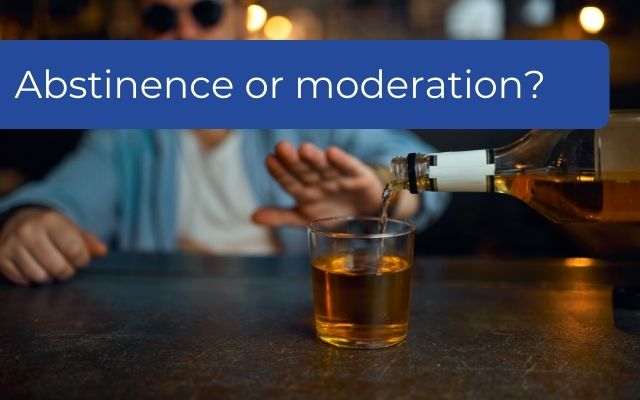Substance use disorder treatment options often leave people with the question, is abstinence or moderation better? Abstinence can be a scary concept, especially for addicts or alcoholics who have come to rely on their substance of choice and moderation may seem like a better ideal especially for those who aren’t yet able to imagine a life without drugs or alcohol. But moderation only works for those with less severe substance use problems. For full-blown addicts and alcoholics, abstinence is the only solution.

With people who have less severe substance use problems attempting to moderate drug or alcohol use can be appropriate. With more severe addictions, abstinence should be the goal.
Do you want to know how severe your substance use problem or addiction is? Click here to find out.
Not every problem drinker or problem user is a full-blown addict or alcoholic. For those who are not yet classified as chemically dependent, research has shown that a moderation approach can succeed in reducing substance-related problems and consequences.
Abstinence or moderation? What’s better complete sobriety or controlled use and moderation?
For problem drinkers the Moderation Management programme exists to help these individuals control their drinking and reduce the negative effects their alcohol use is causing to their lives.
People in this category still have an element of control when it comes to their drinking or drug use.
Those who are likely to succeed in moderating or controlling their drug or alcohol use are people who:
- Have shorter substance use histories and have less severe alcohol or drug-related problems
- Have never been physically addicted to drugs or alcohol (and who have never experienced physical withdrawals)
- Are not currently struggling with significant life problems like divorce, unemployment, bankruptcy, severe medical illness, death of a loved one or other psychiatric illness
- Have no other medical problems that would be made worse by even moderate substance use
Those who have crossed the threshold into addiction have, by definition [hyperlink to Definition of substance abuse blog], completely lost control when it comes to substance use and, for these people, no amount of willpower will allow them to drink or use responsibly or in moderation.
Those with severe addictions have to work towards abstinence-based recovery because once they pick up a drink or drug, they are unable to stop or control the amount they drink or use.
Most people who come into treatment are classified as addicts or alcoholics and have experienced severe consequences from their substance use. This is why most rehab centres use abstinence-based treatment strategies.
However, the issue of moderation versus abstinence is highly controversial because many full-blown addicts and alcoholics wish they were in the category of user who is able to moderate. They may delay seeking treatment, and experience worsening consequences, in the belief that they will be able to moderate their substance use ‘one day’. These addicts and alcoholics will repeatedly try and fail to moderate. This is a form of denial that many addicts suffer from. It is also referred to as the great delusion of addicts and alcoholics; that some day they will be successful drinkers or users like ‘other’ people they know.
If you have tried and failed to moderate your drinking and using multiple times, it is a good idea to be assessed by a professional and consider rehabilitative treatment – with the goal being abstinence or total sobriety.
Every addict or alcoholic’s journey is different and it might be necessary for the affected individual to try the moderation approach in order to realise that they are simply unable to control their substance use. Developing this self-awareness might be the first step in an individual’s journey to recovery and, if necessary, rehabilitative treatment.
Those who are not ready, willing or able to completely abstain from drugs and alcohol should be encouraged to moderate in line with the principles of harm reduction.
What is harm reduction?
Harm reduction refers to “policies, programmes and practices that aim to minimise the negative health, social and legal impacts associated with drug [or alcohol] use, drug policies and drug laws”. Harm reduction approaches include encouraging less risky drug and alcohol use, measures to prevent overdoses and the provision of education and psychosocial support related to drug or alcohol use.There is always help and there is always hope and help available. Changes Rehab Johannesburg is here to guide and support you through each step.
Call 081-444-7000 or email [email protected] to get the help you need today.